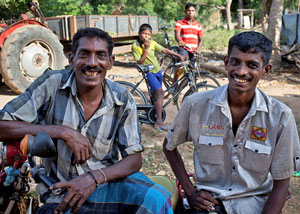Australia and the World Bank are working in places like Kallaru village in north Sri Lanka to repair roads and other infrastructure destroyed in past conflicts. With better roads, farmers can take their goods to market. Photo: AusAID
Fragility and conflict are priority issues for Australia's aid program. The majority of Australia's aid goes towards helping fragile states; of the top 10 recipients of Australian aid, seven are considered fragile or conflict affected. These are countries where the government has limited capacity or will to provide basic services and security to its citizens, and the relationship between the government and its citizens is weak. Australia has developed innovative, practical approaches to get the best value for its aid program and make a real difference in reducing poverty on the ground.
The World Bank also has considerable experience in delivering programs in fragile settings and has strong networks with the global development community. Since 2000, the International Development Association has provided more than US$11.2 billion in post- conflict reconstruction assistance to fragile and conflict-affected countries. Commitments to fragile states have increased from US$396 million in 2009–10 to US$2.4 billion in 2010–11. The World Bank is also leading international thinking on aid effectiveness in fragile environments, building on the 2011 World Development report Conflict, Security, and Development [external website].
In July 2011, the World Bank launched the Global Centre on Conflict, Security and Development. The centre provides support to country teams and access to the latest research and knowledge on what works in volatile environments as the World Bank puts into practice the 2011 World Development Report. A new knowledge-sharing platform will connect practitioners, researchers, policymakers, and organisations working on issues of fragility, conflict and violence.
The World Bank and Australia have prioritised cooperation to share learning and trial innovative approaches in fragile and conflict-affected states. For example, AusAID's Core Course on Fragility and Conflict, delivered to more than 70 Australian public servants in 2011–12, is based on a World Bank training package. Australia continues to engage in the State- and Peace-building Fund, the World Bank's primary vehicle for supporting state and local governance and peace-building efforts in fragile and conflict-affected regions. The fund is currently supporting 44 projects worth USD$95.5 million. Projects include employment generation, justice and governance reform, and processes to enhance the targeting of vulnerable groups and improve conflict sensitivity in mainstream investment programs.
Priority is also given under the Australia – World Bank Partnership to small states. Australia is the largest donor to small island developing states, including East Timor and countries in the Pacific, Caribbean and Indian oceans. Australia has been successful at working with the World Bank Group to ensure its programs are accessible and relevant to even the smallest nations.
Sharing experiences
AusAID seconded an adviser to the Fragile and Conflict-Affected Countries Group section in the World Bank from May 2008 to 2011. The adviser played a senior role engaging on policy and operational issues that affect small states and fragile and conflict-affected countries. As the principal contact for all the World Bank's Pacific activities, he provided advice and support on engagement in small states issues. The adviser also provided input to World Bank operations in Afghanistan, Liberia, Pakistan, the Philippines, Sierra Leone, Thailand and Zimbabwe.
Improving infrastructure in conflict-affected areas
Australia is working with the World Bank and the Government of Sri Lanka to improve access to local infrastructure services in conflict-affected areas in the north and east of Sri Lanka. The program is repairing and constructing new infrastructure and will also enhance the capacity of local government authorities to design, implement and manage infrastructure development. The project supports economic activity and supply-chain improvements that will benefit around 370,000 people by supporting food production, trade in goods and services and attracting additional investment to the region.

